The world needs backpacking after COVID-19. The travel industry needs backpackers, and getting backpackers back on the road is vital to the recovery of the global tourist industry.
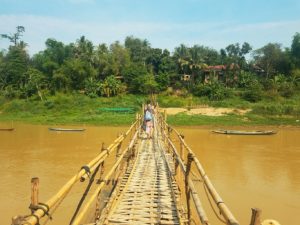
Backpackers are an overlooked segment of tourism. And stereotypical backpacker stories involving ignorance or debauchery – offending local customs, wild parties, drugs, etc – seem to be the only attention levied upon this segment of travel.
In reality, this is the great exception. An overwhelming majority of backpackers are simply budget travelers. These aren’t people traveling to satiate a need for depravity or seeking illicit fun at any turn – they’re just cheap! And though they may be stingy, backpackers are the backbone of global tourism. When tourism resumes after COVID-19, backpacking needs to be at the forefront of travel recovery.
Contents
The Importance of Backpacking
Backpacking is serious business. Quietly, the backpacking sector of the travel industry has grown to massive revenues supporting millions of jobs and families around the world. Backpacking is important to the global tourist economy and should not be left out when travel resumes on a global scale. Here’s why:
The Economics of Backpacking
Backpackers are a significantly larger part of the travel industry than one might presume. The United States alone caters to around 10 million backpackers each year. Worldwide, the number of backpacker trips taken is nearly 45 million per year, with the average amount of money spent per trip approximately $4000 USD in 2017.
These are statistics from WYSE Travel Confederation, from younger travelers who identified as backpackers. Depending on your definition of “backpacker,” those numbers (people and revenues) are likely to be significantly greater.
This means that backpackers are spending HUNDREDS OF BILLIONS of dollars globally each year. That estimation is further supported in a Forbes article from 2013.
Maybe backpackers don’t drop the same levels of cash as a family at Disney World or a couple honeymooning in paradise. And a backpacker’s budget is also typically spread out over a longer period of time than a traveler on a more traditional vacation.
But hundreds of billions of dollars is serious cash, serious economic impact. By these measures, the backpacking travel industry is greater than the GDP of most nations in the world.
Backpacking Benefits are Far-Reaching
Though backpackers may not spend as much money as other types of travelers, the economic impact of backpacking is (literally) more far-reaching than that of other travel sectors.
Let’s look at Southeast Asia, for example. It’s fairly easy to guess the destinations or general itinerary of the typical tourist in the region: Bangkok, the Thai Islands, Siem Reap (Angkor Wat), Bali, Singapore, Ho Chi Minh City – that’s fairly comprehensive, right?
These are all fascinating places to travel, but the economic impact of tourism in these countries is wildly polarizing. It’s obvious when you travel almost anywhere else in these countries. For instance, Siem Reap is full of fancy hotels, trendy shops and nicer restaurants, but a vast majority of Cambodia looks much different. With a majority of tourists in Cambodia coming to see Angkor Wat, a large chunk of the economic benefits stay in that area.
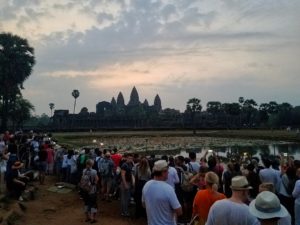
That’s only natural, and it’s perfectly reasonable. Tourists are drawn to major tourist attractions.
Backpackers, on the other hand, are likely to see more destinations in Cambodia. A traveler backpacking in Cambodia for 2-4 weeks may not spend the same amount of money as the tourist who spends a few days at a resort in Siem Reap, but who benefits?
Resort guests are less likely to support independent shops and restaurants in town, opting instead for the high-end amenities on the resort property. That resort is probably not even owned by a local Cambodian anyway. Sure, a few people gain employment, but the bulk of profits are going overseas or greasing palms.
Backpackers’ spending supports hostels, small guesthouses and local transportation companies as they travel through Cambodia. They’ll spend money eating and drinking at local bars and restaurants from Phnom Penh to Battambang to Kep and Koh Rong. Backpackers tend not to drop large sums of money, but the money they do spend supports a wider array of local people.
Cambodia is only one example. Similar cases can be made for travel throughout the world. Backpackers are some of the first tourists to “discover” a travel destination. When travel as we once knew it resumes, backpackers will be the first tourists back and spending money in the lesser-visited places of the world.
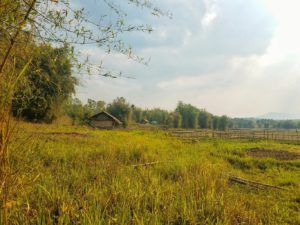
The economic impact of backpacking reaches far beyond the major tourist attractions and big cities. Backpackers visit these major tourist destinations, too, but they are also the ones more keen to visit remote destinations. They spend money in places many tourists don’t even know exist.
Unfortunately, the return of travel after COVID-19 has complicated things. The importance of backpacking is being overlooked.
Big Travel
The economic effect of COVID-19 has been detrimental to the travel industry. It’s noticeable when we see large hotels empty. It’s obvious when every big business to which we’ve ever naively given our email address blasts out email after email telling us “these times are tough” and that we’re “all in this together.” Ya know, so we don’t forget about giving them our money when the time comes.
The negative impact of COVID-19 on travel is clearly evident when it comes to Big Travel. All you have to do is turn on the news, drive by an airport or look at the stock prices over the last year of airlines, large hotel chains and cruise lines.
But what about everyone else? What about the small businesses?
For every Marriott and InterContinental that is temporarily closing its doors and “looking out for the safety of their valued customers,” there are dozens of small, family-owned hotels, guesthouses and hostels on the verge of collapse. For every canceled Delta, British Airways or Singapore Airlines flight, there are independent tourist transportation companies that are closing their doors forever.
Small businesses in the travel industry don’t have billions of dollars in cash reserves. They can’t “weather the storm” by selling more stock or airline miles. Furloughing employees is a moot point when the employees are your own family members. And government relief is – well, government relief is an oxymoron.
Big Travel will be fine. Like the politicians around the globe that haven’t missed a paycheck while forcing individuals and businesses into bankruptcy, Big Travel will be fine.
It has the cash reserves and infrastructure to survive the economic devastation of this pandemic. Even for the larger companies that don’t have heaps of cash stowed away, governments and banks are eager to get them up and running soon.

After all, a big hotel brings in a lot of local tax revenue (even if the profits probably wind up halfway around the world). Why would a government or financial entity worry about supporting hundreds of local business owners who, in turn, support local communities? It’s easier to support a billion-dollar company that employs local people as housekeepers, cooks, janitors, bellhops and other low-paying jobs? That makes sense! Good thing it has nothing to do with lobbyists or corruption! (*note sarcasm.)
The point is, Big Travel is going to make it through. The rest of the travel industry, much of which quietly depends on backpackers, may not be so lucky.
Backpackers support small businesses. For every tourist that spends a week at an all-inclusive resort, there are backpackers who stay in locally-owned hostels, guest houses or homestays. For every tourist who flies directly into Siem Reap, visits Angkor Wat and flies out a few days later, there is a backpacker who spends another week or two in Cambodia spending money and supporting locally-owned small businesses.
When hordes of tourists give thousands of dollars to a hotel that has corporate headquarters thousands of miles away, the profits from that tourism has a significantly limited impact on the local economy. When you stay at the JW in Bangkok, the InterContinental in Santiago de Chile or the Novotel in Marrakech, that boosts the profits and bottom lines of companies in Maryland, London and Paris, respectively.
Before anyone starts to wonder, let me make something clear: I am not an anti-capitalist, and I neither support nor sympathize with socialist ideologies. I have no issue with hardworking people who grow their businesses into mountains of success and unfathomable revenues. And I will not deny there is an economic benefit of these successful brands.
In fact, the last thing the Hangry Backpacker is supposed to be about is politics. That is a topic I prefer to leave for others. Travel and politics are always intertwined, but that relationship has grown more complicated of late.
What I cannot stand for is the preferential treatment these massive corporations receive over smaller, independent competitors. When it comes to economic relief, the travel industry, the COVID-19 pandemic and the reopening of tourism thereafter, nepotism is alive and well within Big Travel.
Despite possessing billions of dollars in assets and large cash reserves in their deep pockets, many large travel companies have received enormous amounts of government stimulus to stay afloat or (supposedly) stave off mass layoffs. Smaller travel-related businesses, from family-run hostels to tour operators and restaurants, are not as fortunate.
Economic stimulus during the COVID-19 pandemic has been rife with controversy from the beginning. Despite some of the questionable payouts, that’s not where I take issue.
The problem is the resumption of travel and the preferential treatment being given to Big Travel and wealthy tourists. Again, I’m not an anti-capitalist, just an advocate for the importance of backpacking and independent travel.
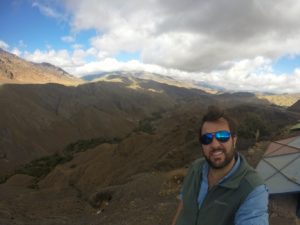
Governments around the world are enacting measures in the name of safety to see some return of travel-related revenues:
- Mandatory quarantines upon arrival (even if you test negative)
- Iceland is allowing tourists who meet income requirements
- Resorts are opening because they can “control” and “monitor” the immediate environment
- Fiji is open… to yachts!
- Thailand originally imposed an income requirement for tourists, though later rescinded
These are a few of the examples of travel after COVID-19 reverting to its old ways. Travel has become more affordable and more accessible to greater numbers of people with each passing year. These restrictive measures for tourist entry, all in the name of “safety,” do little to stimulate the local economy, benefit few locals and serve only the elite of travelers.
A few wealthy tourists might inject some quick revenue into an area. Reopening an all-inclusive resort might bring a few, low-paying jobs back into the fold. But what about the small businesses that depend on tourism? How do yachts with a few people and resorts at half-capacity help struggling restaurant owners and tour operators?
Thailand’s reopening plan received a lot of attention in the travel world, but it has proven to be a huge failure, this far. I can only imagine this is due to the insane plan to lure someone halfway around the world, only to then force this person to isolate in a room for 10-14 days. Yeah, no thanks.
While travel options are more reasonable for wealthy individuals, backpackers, budget travelers and poorer individuals trying to travel in the age of COVID are ignored. Even large bus companies are struggling, though their budget-conscious customers are the real losers, unable to affordably travel for any reason.
Conscientious Travel
Conscientious buying – that is, buying from a company that has a good reputation for treatment of its employees or purchasing a product that supports a good cause – is trending upward in recent years. This is a good thing (and, by the way, pretty much the epitome of Capitalism 101).
Conscientious travel is, from an economic standpoint, making an effort to support local business and the local population when traveling. Whether that is done by choosing to stay in a hostel, eating at local cafes or shopping at local stores, there are a variety of ways to travel conscientiously.
Backpacking at its most basic level means traveling on a budget, and large, recognizable brands are typically out of the price range of backpackers. This leads to a huge segment of travelers seeking more affordable options. The result is a large contingent of hostels, small hotels and guesthouses catering to budget travelers.
Backpacking largely, by default, has a similar impact as conscientious travel. Whether or not a backpacker travels with the intention of saving the world, the effects of this kind of travel are more likely to benefit local citizenry.
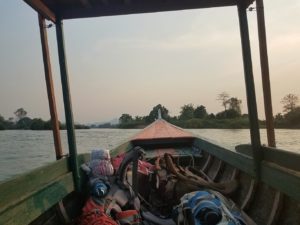
In recent years, as consumer habits trend towards more conscientious buying, travelers have also become more aware of where their money goes. Backpacking has been a more conscientious method of travel for decades, and, when travel really, fully reopens after COVID-19, backpacking should be at the forefront.
Backpacking is an easy way to travel conscientiously, but it’s not the only way. And my goal here (in this post) is not to convince people to start backpacking. I do that on a regular basis anyway.
Rather, when the time comes that travel resumes after COVID-19, instead of hopping on a plane to the nearest all-inclusive piece of paradise that benefits Big Travel thousands of miles away, maybe find a local hotel or even an Airbnb in that destination. Or, if you really want to experience the backpacker vibe, there are plenty of reasons to stay at a hostel.
The Current State of Travel
As previously mentioned, travel has become more accessible and affordable than ever. Whether this is due to relaxing visa policies/entrance requirements, the rise of the Airbnb-type of accommodation, improved fuel efficiency (and, thus, lower prices) of air travel, more people are able to travel. Prior to COVID-19 slipping out of China and crushing economies and livelihoods around the world, more people were traveling than ever.

Obviously, at the time of this writing (end of 2020), there isn’t much travel of any kind happening around the world. Most people who are traveling now, though few in number, are traveling slowly, locally or staying put in one area.
The digital nomad contingent, along with the lockdown-fatigued, is finding (primarily warm) places accepting outsiders and settling in to pass the Winter months or wait out the rest of the pandemic. Mexico, in particular, is crawling with tourists seeking an affordable, warm and open place to travel. Mexico has provided exactly that.
Turkey and several countries in the Balkans have largely remained open and capitalized on the fledgling tourist market. With pre-travel testing requirements and constantly-changing rules, travel in these areas has been, at best, unpredictable.
Aside from digital nomads and a few destinations catering to yacht-goers, the current state of travel is virtually nonexistent. However, even if more countries were open to tourism, there are a lot of curiosities and uncertainties regarding the state of travel.
Several countries that permit tourists entry are requiring said tourists to quarantine for up to 14 days upon arrival. For the average tourist, that means they cannot go. It simply isn’t worth taking a trip if they have to spend two weeks stuck in a hotel room. In some cases, even a fresh negative COVID test is insufficient to exit this quarantine. So, why even bother?
For backpackers and budget travelers, budgets are not designed for two weeks of thumb-twiddling in a (likely-overpriced) pre-approved hotel quarantine. These measures eliminate a majority of prospective travelers from the start.
To make matters worse, there are some countries blatantly tracking tourists by requiring them to install tracking apps on their phones. I mean, we all know governments and tech companies can and will track us if they so choose, but to blatantly, openly require tracking does not sit well with a lot of people.
Travel & COVID Vaccines
Then there’s the vaccine. By all accounts, the COVID vaccines could be the saving grace for travel, tourism, restaurants, sports and so on. But it’s a little more complicated than that. Some countries are floating the idea of requiring vaccines in order to enter.
On the business side, some travel companies are considering requiring customers to be vaccinated in the future. Specifically, Qantas, an Australian airline, was one of the first to make such an announcement.
As I am NOT an epidemiologist or virologist or whatever expert who knows about vaccines, I’m not going to argue for or against the safety and efficacy of a vaccine. I am not the expert, and I am not going to pretend to be an expert.
What I can understand, though, is the anger and outrage over the prospect of a COVID-vaccine passport in order to travel. I can understand the frustration with being denied service for not being vaccinated when you are healthy and can prove it. Thus, I am not surprised by the reactions to this news or the backlash against Qantas.
I’m all for travel. As one who has been personally crushed by the collapse of the travel industry, I’m not particularly opposed to being vaccinated myself (whether or not I think it’s necessary as a healthy, active 30-year-old). In fact, if the vaccines are deemed safe, and getting injected means I will soon be allowed to travel freely, I’ll get one as soon as possible.
What I’m not thrilled about is the possibility of being tracked (more than usual) when I travel. I’m not naive. No one lives a wholly unsurveilled life in the 21st century, but the idea – at least some semblance – of privacy is appreciated.
My American spirit is also resistant to being forced to do just about anything. And I’m really not so happy with the idea of a COVID passport.
My personal feelings aside, I am reluctant to believe that any of these proposed measures will succeed, much less receive widespread support. And this may further complicate the state of travel in the coming months.
If these requirements are not embraced by the public, a resumption of travel after COVID-19 will be moot. In other words, it doesn’t matter if a country reopens its borders to tourists if people aren’t willing to be vaccinated, tracked and acquire a special COVID passport.
In other words, the current state of travel is complicated, controversial and grim. And while I am trying to remain optimistic, the future of travel is uncertain.
What’s Happening With Backpacking Now?
At the moment, backpacking is almost nonexistent. The infrastructure of backpacking is almost entirely shut down.
Hostels
Hostels are largely closed. The nature of shared spaces and dorm rooms is not exactly in line with COVID-related safety protocols.
There are tens of thousands of hostels around the world, and a majority of backpackers stay in hostels. These hostels are primarily independently owned and operated as small businesses.
The widespread closure of hostels adds another challenge for backpackers and other budget travelers. While there are still affordable options out there, some of the countries currently open for travel are not allowing hostels to operate dorms. Hostel prices are inflated in other places.
Hostels are part of the fabric of backpacking. At the moment, however, hostels are in a grey area of operation that tends to vary significantly by region.
Tour Groups
Tour groups, those that take backpackers and budget travelers on day trips and short excursions, are shut down. Many of these attractions which draw tourists are closed anyway. Even in the few places that are open, tour groups for day trips are limiting capacity. That is unsustainable.
I personally know an individual in Laos who operates a hostel/guesthouse and small tour company. By Lao standards, he does pretty well. However, he is on the verge of bankruptcy as he hasn’t had a single tourist or guest in months.
I doubt the Lao government has been sending out tremendous amounts of economic relief. In fact, “relief” in Laos is predominantly in the form of tax exemptions for low income earners, however, that doesn’t really matter for those in the tourism industry who have no income to tax anyway.
That’s not a jab at Laos. The country (and many, many others) simply cannot afford to hand out billions of dollars on a whim, and this man I know cannot depend on domestic tourism in a very, very poor country.
Personally, I hate hate organized tours and tour groups, but they have their place and purpose. For backpackers traveling now, don’t expect much from tour groups. Those that are somehow still in operation have limited services.
Transportation
Small, independent transportation operations which tourists support are largely shut down and out of business. This applies to the tourist-dependent transportation operations, though, so backpackers aren’t entirely stuck with hitchhiking.
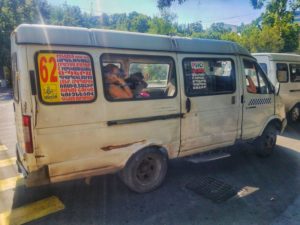
Unlike other aspects of backpacking, the transportation situation is not as dire. Tourist transportation companies are in a bind, but backpackers often take local transportation. Local transportation companies may be feeling the effects from a lack of tourists but are generally still in operation as they exist to primarily serve local residents.
Restaurants & Food Service
The food service sector is getting destroyed by a lack of tourism. In the United States, 1 out of 6 restaurants (over 100,000) has closed permanently. That’s a national average in the wealthiest country in the world. In areas reliant on tourism, that number is probably higher. Internationally, the outlook for restaurants is more bleak.
Backpackers traveling now will find a lot of typical backpacker haunts closed. The backpacking community is a major supporter of thousands of cafes, restaurants, bars and nightclubs. This industry is not doing very well at the moment.
Perhaps the most notable change in backpacker eating habits will be street food. Street food is the best. It’s provides a fun, cheap, authentic and delicious way to enjoy our travels even more. Backpackers are big supporters of street food in tourist destinations, and that market has all but vanished.
In Thailand, one of the great street food countries of the world, vendors have disappeared. This extends to food halls and night markets around the world.
Like all travel at the moment, backpacking looks a lot different across the world. It hasn’t completely disappeared, but it’s not the same.
The Future of Backpacking After COVID-19?
The near future of travel in general is fairly clear, even if the specifics remain uncertain. Eventually, probably sooner than later, more and more countries will open their borders to tourists. This trend will continue in the coming months as vaccines roll out and economies can no longer withstand the travel shutdown.
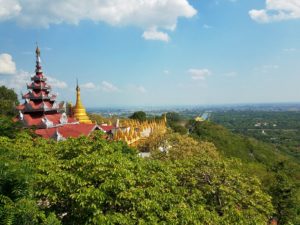
We’re already seeing airlines slowly increase available flights and destinations. Cruise lines are preparing a return to the seas. Resorts are beginning to reopen, and large hotel chains are ready to welcome guests.
The future of backpacking, on the other hand, is unclear. Sure, eventually, backpacking will return to normal. Due to the financial abilities of (and preferences given to) Big Travel, how long the resurgence of backpacking will take is anybody’s guess.
The Negative
The unfortunate truth is backpacking will probably be slower to return than other, more lucrative sectors of the travel industry. Despite the fact that the economic impact of backpackers is far-reaching beyond major cities and resorts, priority will be given to the larger tax generators.
When it comes to tourism, most governments prioritize a faster, larger overall revenue above a larger number of individuals benefiting from said revenue.
Hostels, bars, cheap tourist transport and attractions – essentially the entire landscape that makes backpacking what it is (and, in turn, that backpackers support) – will see a slower return to normal than larger competitors. I don’t want to be a pessimist, and I hope I’m (quickly!) proven wrong, but all signs point to priorities given to Big Travel.
I anticipate the emphasis of initial tourism reopenings will fall on high-volume, big-spending ventures. These places make it easier for governments to point to higher revenues (even though they’re concentrated in smaller areas and fewer hands), monitor reopenings, cheer “economic recovery!” and promote the idea of “safely” returning to travel.
The Positive
In Western countries, we all clamor about the importance of small business. We brag about “buying local” and supporting the little guy at farmers markets. Why does that go right out the door when we travel?
Of course, for obvious reasons, I’m not talking about airlines. Once on the ground, too many tourists suddenly don’t care about supporting local businesses anymore. Small business is the backbone of economies all around the world, not just your hometown and mine.
Backpacking should be the first kind of tourism in the post-COVID world of travel. I highly doubt this will come to fruition, but it would be an excellent way for countries to ease back into tourism and see the impact of travel expand beyond big cities and Big Travel.
When travel resumes, backpacking after COVID-19 will be more important than ever. Those of us who choose to travel beyond the big cities and all-inclusive resorts will be helping the economic recovery process spread to small and independent businesses.
Backpacking after COVID-19 will be an opportunity to travel and make a difference with our spending. It’s not all charity, though, and the first backpackers on the road after COVID-19 will enjoy some special experiences.
Imagine traveling to one of your bucket list destinations – one of those famous and always-crowded places. Only when travel resumes after COVID-19, backpackers will have the chance to truly beat the crowds.
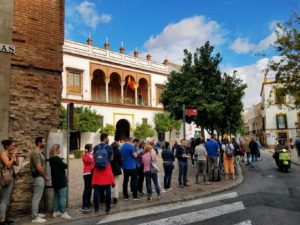
A lot of people will be hesitant to travel, and the first wave of travelers going back out into the world probably will be so happy to be somewhere different that the focus won’t be on going somewhere unusual or too far off the beaten path. Hordes of tourists that have driven so many travelers away from some of the world’s spectacular attractions may be few for a brief time.
Chances like this rarely come around. Overtourism is real. If you want to see some of the world’s amazing sights with fewer people, be ready to pack your bags. And, maybe, wait for others to join you. Perhaps they’ll eventually decide to tag along. Of course, if you’re serious about going sooner than later never, you can always set off by yourself.
Backpacking after COVID-19 may also be cheaper, too. Ultimately, this remains to be seen, but simple economics would suggest prices will be competitive to attract the business of the few travelers in the first waves.
Not a Backpacker? What Can You Do?
As travelers, we are consumers. We can control (to an extent) where our money goes.
When the time comes that you decide to travel again, whether that is halfway around the world or a brief weekend away, spend wisely and thoughtfully. Support small business as much as possible.
You can stay at an independent hotel. Eat at a local cafe. Shop somewhere that isn’t a mall or big box store.
You don’t have to undertake an enormous backpacking adventure to save the world when you travel. Though I highly recommend doing so if you are able, there are plenty of ways to travel independently, travel cheaper and support the forgotten sectors of the global travel industry.
Local and independent tourist services provide the experiences that make our travels unique and memorable. Now, more than ever, this part of the travel industry needs our support.
COVID-19 has nearly killed travel. Tourism of any kind is on life support. Measures have been taken by governments and businesses in an attempt to alleviate the pain, but these measures are not feasible on a long-term basis.
Whatever happens in the next few months, the demand for travel – truly, the intensely growing desire to travel – is increasing by the day. We’re all sick of this mess, especially those of us afflicted with severe wanderlust. (And that’s nothing compared to the COVID effects no one likes to talk about or the thousands of additional cancer deaths caused by COVID lockdowns.)
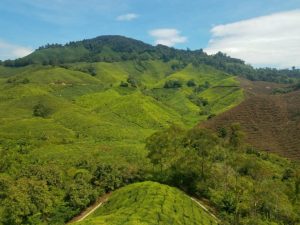
Backpacking is one of the most enjoyable, educational and enlightening ways to travel. It’s cheap, exciting and, best of all, so much fun. Unfortunately, the conversation surrounding travel after COVID-19 largely forgets to mention backpacking.
Backpackers are the foundation of small, independent travel. When the time comes, traveling on the cheap, with little more than a backpack and a desire to experience the world, will be better and more important than ever. Don’t miss out.
Leave a Reply
You must be logged in to post a comment.